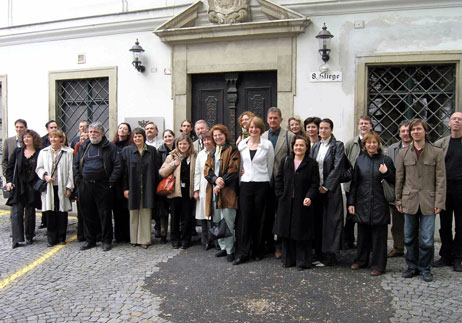Use of cookies
Cookies help us to provide our services. By using our website you agree that we can use cookies. Read more about our Privacy Policy and visit the following link: Privacy Policy
The DIALOG project is based on the Population Policy Acceptance Study (PPAS), a comparative survey of attitudes and opinions concerning demographic changes, demographic behaviours and population related policies in European countries. It contributes to the dialogue-based modernisation of social protection by addressing key areas of risk-reducing policies, programmes and services from the viewpoint of individual citizens and policy actors. This project promotes dialogue, capacity building and networking in the area of public policies towards families (in view of changing patterns of family formation and dissolution) and public provisions and family care towards the elderly (in view of population ageing).
The study is a comprehensive analysis of population related policies which builds on but also extends beyond the area of publicly funded family policies and addresses also within-family strategies. It addresses practices and aspirations of men and women regarding family life in ageing societies and the perception of life chances regarding paid work in an increasingly more competitive and demanding labour market. It takes into account both the viewpoint of citizens and policy actors regarding the management of population related changes, caring functions of families and mediating role of the welfare state.
The overarching objective of the DIALOG project is the analysis based on cross-sectional survey data on European’s practices, attitudes and opinions concerning demographic changes, fertility behaviour, intergenerational exchange of resources and services, and population related policies. The study aims to analyse values and attitudes affecting fertility decisions, perception of advantages and disadvantages of having children, meaning of family and parenthood, preferences and aspirations regarding gender roles, paid labour and family life, aspirations in life, opinions and attitudes towards seniors and population ageing, role of government in providing support to families and the elderly.
At the policy level, a systematic comparative analysis of the acceptance of existing population policy measures and expectations regarding future is expected to provide informed basis for the development of integrated population policies through active participation of citizens in shaping their own family-related choices in a more family-friendly environment. Dialogue between policy actors, citizens’ associations and individuals is expected to promote democratic decision processes regarding population policy formation and improve governance. Scientific results are expected to bring the broadening of the theoretical knowledge about the impact of population policies on individual behaviour and the interaction between attitudes, expectations and behaviour. The results relate both to empirical concerns and impetus for the verification and construction of theories concerning the inter-relationship between fertility behaviour, within-family transfers of resources and care, gender equity and public policies. In view of the participation of several associated countries the project addresses capacity-building and is expected to be of policy relevance for the ongoing enlargement process.
The project will set up the infrastructure to improve methodologies for comparative research in view of data harmonisation, setting up of an international database of the participating countries, and comparative analyses. The Delphi study in conjunction with other information will serve as a tool for making of predictions regarding future and identifying innovative solutions. In the DIALOG project ex-ante evaluations of the expected effects of future policies in the field of population ageing and family building process will be analysed. In addition, the Delphi study will include ex-post evaluations of policy measures that have been implemented in the recent past. The desk review of literature and contextual analysis will set stage for the comparative analysis of the interaction between population related policies and demographic processes. It is a tool for qualitative identification of between country similarities and differences and general trends at the European level in view to reveal the relationship between the demographic setting, cultural norms and individual values and expectations towards the state. Analysis of the micro-level data from the European comparative study of attitudes, experiences, preferences and evaluation of policies is implemented through topical work packages which include five broad areas: general family related policies and attitudes; gender roles in partnership, family life and work and opinions about government policies with respect to gender related rights; reconciliation of work and family life as it relates to the combination between employment, housework, child care, and care of elderly; attitudes and experiences about having children and child-friendly policies; attitudes, experiences and expectations regarding intergenerational solidarity, elderly, one’s own old age and population ageing.
For more information regarding the data set, see Population Policy Acceptance Study (PPAS).
2003–2006
DIALOG is an international research project with the following institutions involved:
The workpackages show the responsibilities of each institution.

![]() The DIALOG group at the consortium meeting in Wien (Vienna), April 2005
Source: Osmo Kontula
The DIALOG group at the consortium meeting in Wien (Vienna), April 2005
Source: Osmo Kontula
The DIALOG project was funded by the European Commission in the 5th Framework Programme (Contract No. HPSE-CT-2002-00153).
The Population Policy Acceptance Study relates to the Key Action Improving the Socio-Economic Knowledge Base of the Thematic Programme Improving the Human Resource Potential and the Socio-Economic Knowledge Base of the Fifth Framework Programme with the aim to identify options for management of change as they relate to population ageing and family dynamics in view to “involve European citizens more actively in shaping their own futures”. It addresses issues “of relevance for the ongoing enlargement process” through its comprehensive coverage of European Union Member States and Associated States and capacity-building for integration.